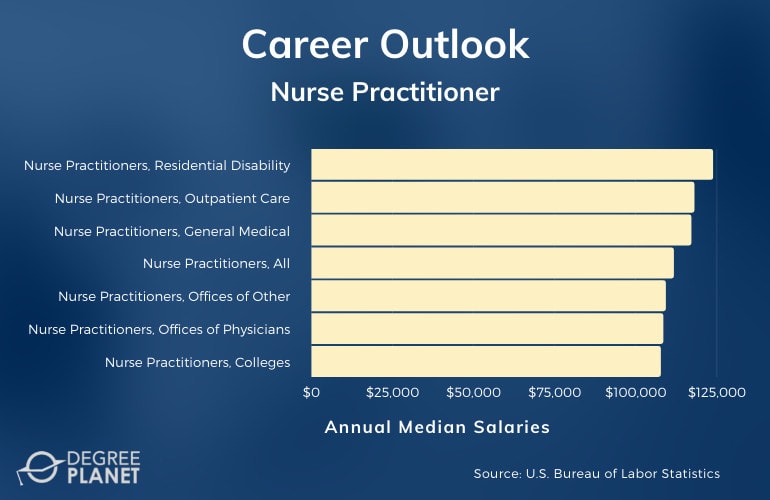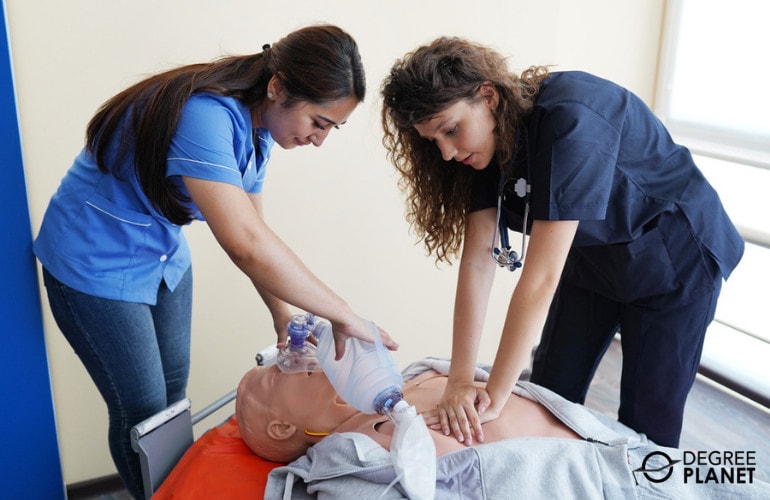Dual FNP ACNP programs offer the opportunity to train in two advanced practice registered nurse specialties: family nurse practitioner and acute care nurse practitioner.

Nurse practitioners (NPs) with certifications in acute care and family practice have the training to take care of patients during sudden accidents or illnesses. They can also take care of the same patients throughout their lifespan.
Editorial Listing ShortCode:
With this hyper-focused dual program, you can develop versatile, specialized training to prepare for advancement in the healthcare industry.
FNP and ACNP Dual Programs

Dual ACNP/FNP programs allow you to train in two high demand areas of the healthcare industry. Earning these two concentrations together either in person or online can be beneficial for various reasons.
For instance, you can save almost a year’s time by pursuing these two concentrations together instead of separately, and money is also saved through this difference in time. Being trained in two NP specializations can help you develop versatile and dynamic skill sets, potentially giving you a competitive edge in the job market.
Editorial Listing ShortCode:
Holding two NP certifications can also open the door to higher earning potential and leadership opportunities.
Family Nurse Practitioner (FNP)
Family nurse practitioners have the specialized skills necessary for clinical family practice. Using nursing theory, FNPs can work with patients through their lifespan, from childhood to adulthood.
This long-term planning role requires family nurse practitioners to do extensive research and play a reactive role in their patient’s health. FNPs can also focus on specialties, such as mental health, pediatrics, or gerontology. They often work in clinics or in medical offices.
Acute Care Nurse Practitioner (ACNP)

An acute care nurse practitioner works alongside physicians to manage patients with sudden injuries and illnesses. In addition, they can help patients who are living with chronic conditions. It’s a very proactive role that requires quick-thinking in emergency situations.
Acute care nurse practitioners are often found working in emergency settings. They not only manage a patient in the moment of trauma but also through their lifespan, as trauma requires constant management and aggravation prevention.
Nurse Practitioner Careers & Salaries

Pursuing dual nurse practitioner programs does not guarantee you employment, but it can let you develop specialized skills. This can help you become a competitive candidate in the healthcare industry.
According to the Bureau of Labor Statistics, nurse practitioner careers can be very dynamic, depending on your specialty and workplace of choice.
| Careers | Annual Median Salaries |
| Nurse Practitioners, Residential Disability, Mental Health, and Substance Abuse Facilities | $123,760 |
| Nurse Practitioners, Outpatient Care Centers | $118,020 |
| Nurse Practitioners, General Medical and Surgical Hospitals | $117,080 |
| Nurse Practitioners, All | $111,680 |
| Nurse Practitioners, Offices of Other Health Practitioners | $109,200 |
| Nurse Practitioners, Offices of Physicians | $108,430 |
| Nurse Practitioners, Colleges, Universities, and Professional Schools | $107,660 |
| Medical and Health Services Managers | $104,280 |
| Nursing Instructors and Postsecondary Teachers | $75,470 |
| Registered Nurses | $75,330 |
Healthcare is a rapidly growing industry. The Bureau of Labor Statistics states that overall employment for nurse practitioners is projected to grow 52% through 2029. As the population ages and as older nurse practitioners exit the industry, openings in this industry will continue to grow.
Nurse Practitioner Dual Concentration Curriculum
Most dual nurse practitioner programs involve hands-on clinical experience in addition to coursework. In a dual program, you have the opportunity to take foundational courses as well as specialty-focused curriculum.
Editorial Listing ShortCode:
Though curriculum varies between schools, programs, and specialties, here are a few courses you may encounter during your nurse practitioner studies:
- Leadership and Health Policy: You’ll learn about management requirements in the healthcare industry and how health policies are integrated into those leadership positions.
- Healthcare Economics: A careful understanding of the economics of patient care is essential to healthcare leadership. You’ll learn how to manage research and care in a fiscally responsible manner.
- Advanced Health Assessment and Diagnosis: You’ll learn the foundations of being in a leadership role in clinical practice, which includes quick decision-making, delegating tasks and responsibilities, and responding to emergency situations with patients. By better understanding your patient’s needs, you can make a more accurate diagnosis.
- Philosophy and Theory in Nursing: Ethics is at the center of making an impactful change in the healthcare industry. This course explores the philosophy of science and the value of evidence in nursing practice.
- Biostatistical Methods: This course investigates and assesses risks in medicine. Using research, statistical information, and comparing theories in healthcare, you’ll learn to formulate medical theories based on this data.
- Research Design and Methodology: In this course, you’ll learn the developmental stages of theories—descriptive, explanatory, and predictive—in order to shape your qualitative research approach.
- Advanced Pharmacology: This course explores an evidence-based understanding of the application and prescription of medications and treatments. You’ll also learn about the management of acute and chronic illnesses through prescribed medication.
- Individual, Group, and Family Therapy: This intensive course offers clinical training in all levels of therapy. You can develop your communication and reasoning skills in order to help patients open up about their personal lives during treatment.
- Advanced Psychiatric Mental Health Disorders: Should students wish to concentrate their work in a mental health institution following graduation, this course helps develop their advanced understanding of mental health disorders and treatment through evidence-based learning.
- Advanced Family Nursing: This course focuses specifically on caring for a patient through their entire lifespan. It looks at the complexities and challenges that come with forming this doctor-patient relationship and how to best formulate care that is ethically responsible for each patient.
Many dual nurse practitioner programs online and in-person have a project or clinical practicum course requirement that is much like an internship. It can be helpful to investigate the curriculum of the school you are interested in to get a better understanding of their course offerings and expectations.
How to Become a Nurse Practitioner

To become a nurse practitioner (NP) you typically need to obtain national certification as well as a license to practice from your state board. Each state has its own specific licensing requirements, but here are common steps to becoming a nurse practitioner:
- BSN. Earn an accredited Bachelor of Science in Nursing.
- RN licensure. Hold an active RN license.
- MSN. Earn an accredited Master of Science in Nursing with an NP specialty.
- Work experience. Complete supervised clinical work hours, specified by your state.
- National certification. Pass national certification exam to become certified NP.
- State licensure. Complete state board’s requirements and exam to obtain NP licensure.
- Continuing education. Maintain license and certification through continuing education.
If you become passionate about a concentration, you can focus your professional experience in that industry as well. A dual NP program can help you be a more competitive candidate and a more specialized practitioner.
If your bachelor’s degree is in a non-nursing field, some universities offer direct entry MSN programs without GRE requirements designed to help you receive entry-level and graduate-level nursing training at the same time.
If you are currently a registered nurse, but do not hold a bachelor’s degree, fast track RN to BSN online programs that some universities offer can help you earn this degree more quickly.
Admissions Requirements

Here are some common admission requirements you may encounter during your search for a dual NP program.
- GRE or GMAT scores (if required). A growing number of graduate schools are no longer requiring standardized test scores for admissions.
- Bachelor’s degree. You’ll typically need a Bachelor of Science in Nursing (BSN) to pursue a dual nurse practitioner program.
- RN licensing. Most NP programs require applicants to have an active registered nursing license.
- Minimum GPA of 3.0. Minimum GPA requirements can vary among schools and programs.
- Letters of recommendation. Some schools request professional references to attest to your skills and competency.
It’s beneficial to look at the specifics admissions criteria for any school that interests you.
Accreditation

Regional accreditation is essential, especially if you hope to work in the healthcare industry. Holding a degree from an accredited institution is a common requirement for obtaining licensure as a registered nurse as well as becoming certified as a nurse practitioner.
Regional accreditation signifies that a school adheres to high academic standards and offers quality student services. Accreditation can also impact the transferability of your credits.
Editorial Listing ShortCode:
When a school has caught your attention, you can visit the website of the Council for Higher Education Accreditation (CHEA) to make sure your school is accountable to a crediting organization.
Nurse Practitioner Licensure and Certifications
Though they can vary from state to state, here are requirements you’ll typically encounter if you wish to pursue nurse practitioner licensure and certifications:
- Hold an active RN license
- Earn a master’s in nursing from an accredited program
- Complete number of supervised clinical work hours
- Register for specialty certification from national organization
- Pass state licensing exam for nurse practitioners
A license transfer may be required if you choose to work in another state. You may also need additional certifications if you plan to work in multiple NP specialty areas, such as family practice and acute care.
Financial Aid and Scholarships

There are numerous financial aid and scholarship opportunities available to qualifying students in the healthcare industry.
The American Association of Colleges of Nursing (AACN) lists numerous scholarship and grant opportunities specific to nursing students. They also have resources for fellowships, loan forgiveness opportunities, and additional aid options.
If you are a practicing nurse, you may want to ask your organization if they offer grants to help employees pursue higher education. In addition, some schools offer scholarship opportunities based on your educational and professional experience.
It can be helpful to begin your financial aid journey by filling out the Free Application for Federal Student Aid (FAFSA). This free form can allow you to see if you qualify for federal aid or student aid through the school you’re hoping to attend.
Advantages of Online ACNP-FNP Dual Programs

There are numerous advantages to online ACNP-FNP dual programs. First and foremost, receiving hyper-specialized training can help you become a dynamic practitioner and may widen your range of career and industry opportunities. In an ever-growing but extremely competitive job market, it’s beneficial to stand apart from other candidates.
A dual concentration demonstrates you’ve been thoroughly trained in these specialized areas. Pursuing a dual concentration can also save you the time it would take to train for these specializations separately. On the financial side of things, you may benefit from higher earning potential with dual NP concentrations.
Since nurse practitioners are required to hold a masters, they typically earn higher annual salaries than registered nurses. Because of the versatility of the skills you can develop through dual ACNP/FNP programs, having multiple specialty certifications as an NP may qualify you for higher pay as well.
Should I Do FNP or ACNP?

Whether you want to pursue a family nurse practitioner (FNP) specialty or an acute care nurse practitioner (ACNP) specialty may depend on your preference in a few categories:
- Responsibilities. ACNPs usually work alongside physicians. They often diagnose and treat patients in emergency situations. An FNP usually takes on a role similar to that of a physician, working with a patient across their lifespan.
- Work environment. FNPs usually work in private offices and clinics. ACNPs can work in a variety of environments, such as clinics, hospitals, or emergency rooms.
You might consider the role you desire along with the long-term career goals you have in order to decide which avenue is best for you.
Can an FNP Get an Acute Care Certification?

Yes, certification in acute care can be obtained following your FNP degree. A family nurse practitioner generally focuses on primary care, but you are still able to pursue additional certifications.
Training for an acute care nurse practitioner (ACNP) specialization is typically offered within a graduate program. You can seek out certification through The American Association of Critical Care Nurses as well.
Editorial Listing ShortCode:
There are also bridge programs available for some NP concentrations. For instance, an FNP to ACNP program lets you receive additional training for ACNP certification if you’re already an FNP.
Can You Have Two Specialties as a Nurse Practitioner?
Yes, you can obtain two specialties as a nurse practitioner, even if your two specialties have nothing to do with one another—such as acute care and psychiatric work. In addition, you have the option to focus on a major specialty and also work in a subspecialty.
Some specialties will require additional certification, while others may not require specific licensing. You have the ability to specialize in many areas, and gaining versatile skills and job experience can open up the doors to even more career opportunities.
Can You Get Both FNP and ACNP?

Yes, you can train in both FNP and ACNP specializations. In fact, a dual program is a strategic option if you are considering multiple NP concentrations. Family nurse practitioners (FNPs) and acute care nurse practitioners (ACNPs) are two distinct but complementary specialties.
They can both work with patients from childhood to adulthood, though FNPs tend to focus on reactive care and ACNPs tend to deliver more time-sensitive, proactive care. These combined specialties can open the door to a variety of career and workplace opportunities.
What Can You Do with an FNP and ACNP Dual Degree?
A dual FNP and ACNP degree can give you versatile skills and advanced qualifications in the healthcare industry. Advanced nursing degrees can offer a wide range of career opportunities within the field.
Nurse practitioners are in high demand. In fact, the Bureau of Labor Statistics is projecting 52% job growth for NPs over the next ten years. NPs with advanced qualifications and experience can also pursue leadership opportunities in the field, such as nursing director or medical healthcare administrator positions.
How Long Are Dual FNP/ACNP Programs?

Dual FNP/ACNP programs typically take 4 to 5 years to complete, depending on the university and your chosen specialty. Your timeframe may fluctuate depending on whether you’re enrolled full-time or part-time and whether your program is in-person or online.
Earning two graduate nursing specialties separately often takes longer. So, pursuing a dual FNP/ACNP program generally saves you about a year’s time, not including any clinical practicum or internships that might be required.
What’s the Difference Between an ACNP vs. FNP?
There are a few distinct differences between an acute care nurse practitioner and a family nurse practitioner.
| ACNP | FNP |
|
|
If you only want to pursue one NP concentration, your career goals will often define which option is best for you.
What’s the Difference Between Acute Care vs. Primary Care Nurse Practitioner?
There are a few key differences between acute care and primary care nurse practitioners:
| Acute Care | Primary Care |
|
|
There are also different specialties—often specifying the age of patients—for nurse practitioners who are interested in acute care or primary care. Specialties include primary care pediatric nurse practitioner or adult gerontology acute care nurse practitioner.
These two roles are very different from one another. Depending on your passions and energy level, choosing the path that is best for you may require additional research.
Is a Dual ACNP/FNP Worth It?

Yes, a dual ACNP/FNP is worth it for many students. The Bureau of Labor Statistics projects 52% job growth for nurse practitioners over the next ten years, which is tremendously faster than the average growth for all occupations.
Healthcare is an extremely competitive industry, and pursuing a dual ACNP/FNP program can offer you dynamic and advanced expertise for the industry. This type of dual program can help prepare you for nurse practitioner certification in the specialty areas of acute care and family primary care.
Editorial Listing ShortCode:
These specialties are distinct but complementary, and a dual program can allow you to earn both at the same time.
Universities Offering FNP and ACNP Dual Degree Programs
Methodology: The following school list is in alphabetical order. To be included, a college or university must be regionally accredited and offer degree programs online, on campus, or in a hybrid format.

Madonna University offers a dual specialization program for those interested in receiving an Adult-Gerontology Acute Nurse Practitioner and a Family Nurse Practitioner degree.
The program requires students to complete 60 semester hours and a clinical placement. Applicants must have 2 letters of professional recommendation, a personal goal statement, and a resume.
Madonna University is accredited by the Higher Learning Commission.

Rockhurst University offers an Adult-Gerontology Acute Care Nurse Practitioner and a Family Nurse Practitioner dual specialization program.
Students must complete 49 credit hours through online courses. To graduate, students must have a minimum GPA of 3.0. Applicants must have a GPA of 3.0 from an undergraduate program in nursing and have an active nursing license.
Rockhurst University is accredited by The Higher Learning Commission.

The University of Arizona offers a dual specialty program for a DNP with Family Nurse Practitioner and Adult-Gerontology Acute Care Nurse Practitioner concentrations. Students must complete 89 credits and 1,440 clinical practicum hours to graduate. Applicants must have 2 references, a resume, and official transcripts.
The University of Arizona is accredited by the Higher Learning Commission.

The University of South Alabama offers a dual role degree program for Family Nurse Practitioner and Adult-Gerontological Acute Care Nurse Practitioner specialization. To graduate, students must complete 57 credit hours online. Applicants must submit an online application and their transcripts through the school’s application portal.
The University of South Alabama is accredited by the Southern Association of Colleges and Schools, Commission on Colleges.

The University of Tennessee offers a dual concentration degree for students interested in Adult-Gerontology Acute Care and Family Nurse Practitioner specialization. To graduate, students must complete 73 credit hours. To be eligible for the program, applicants must submit references and a list of past work experience.
The University of Tennessee is accredited by the Southern Association of Colleges and Schools Commission on Colleges.
Getting Your Dual FNP & ACNP Online

Dual ACNP/FNP programs allow you to pursue two specialized nurse practitioner certifications. This advanced nursing degree can also help prepare and qualify you for leadership positions in the healthcare industry.
There are schools that offer dual concentration NP programs with both in-person and online learning options. Online combined masters programs often allow you to schedule your classes according to your needs and to plan payments and enrollment around your financial situation.
If you’re ready to advance your nursing career and expertise in this ever-growing field, you can begin your journey by exploring accredited schools that offer various dual FNP and ACNP program options.

